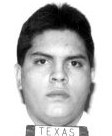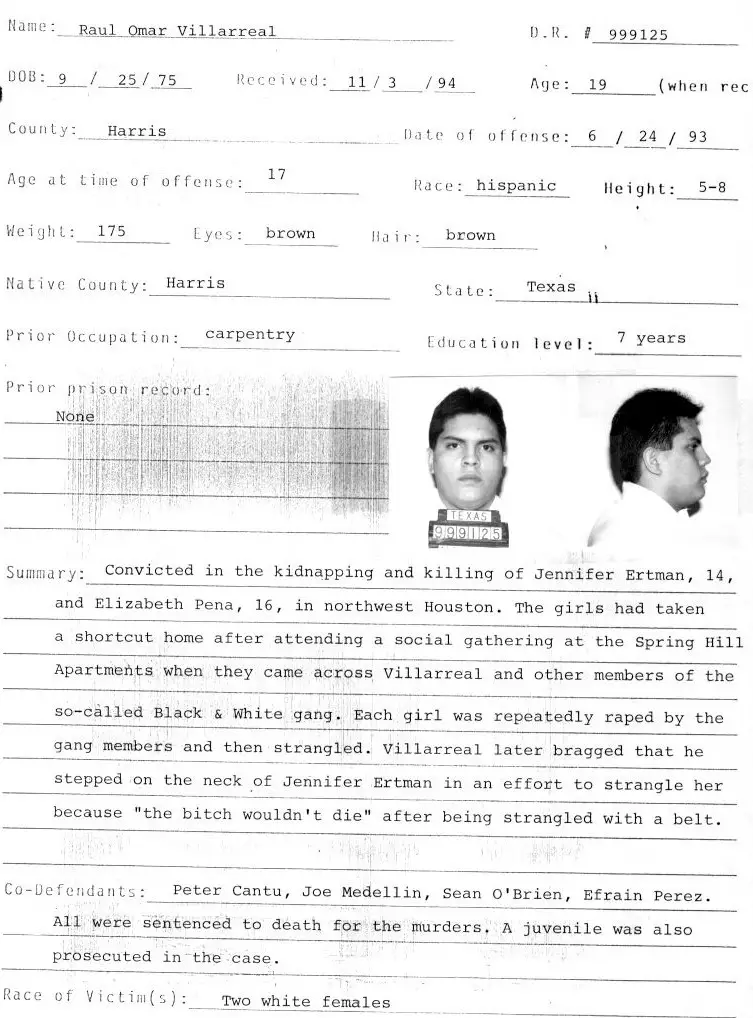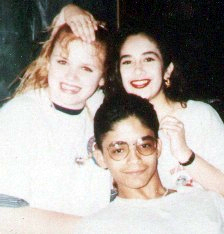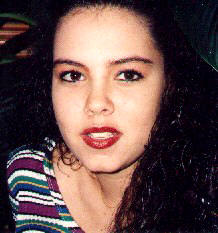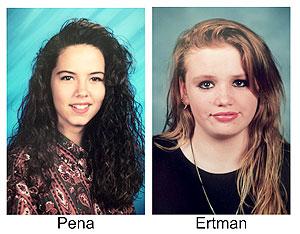Raul Villareal
Harris County prosecutors asked
judges to cancel Villarreal's execution date pending Simmons.
Case Overview
Raul Villareal, a Latino male, was 17 years
of age when he participated in the gang rape and murder of
Jennifer Ertman, 14, (white) and Elizabeth Pena, 16, (Latina) in
Harris County, Texas on June 24, 1993. He was subsequently found
guilty and sentenced to death on September 22, 1994.
Facts of the Case
On the evening of June 24, 1993, Jennifer
Ertman, 14, and Elizabeth Pena, 16, left a friend’s apartment
and were taking a shortcut home through the woods, when they
encountered Villarreal and other members of the so-called “Black
and White” gang. All six gang members were engaged in a gang
initiation rite for Villareal. The gang had spent the evening
drinking and ‘jumping in’ Villareal; requiring him to fight all
of the other members until he lost consciousness. At the trial
it was shown that Villareal had fought three members before
losing consciousness briefly.
After stumbling across the Black and White
gang, each girl was repeatedly raped by the gang for the next
hour. The girls were then strangled, beaten, and kicked to death.
Following a tip-off by the brother of one of
the gang members, the bodies of the girls were found four days
later in dense brush along a railroad track in northeast
Houston, close to where they had been raped and killed. Raul
Villareal was one of the five gang members charged with capital
murder in the case.
His co-defendants were: Peter Cantu, Joe
Medellin, Sean O’Brien, and Efrain Perez. All were sentenced to
death for the murders of Ertman and Pena. Medellin’s brother,
Venancio, who was a juvenile, was also prosecuted. He received a
40-year sentence.
The Trial
After the completion of the first two trials,
(Peter Cantu in January and Sean O’Brien in March 1994) – the
decision was made to try the remaining three defendants
concurrently to save time and money. Assistant District Attorney
Don Smyth believed that it was Harris County’s first
simultaneous trials of three defendants. The three trials, held
in separate courtrooms before separate judges and juries, all
started at various times on Monday, September 12, 1994.
Separate juries found Perez, Villareal, and
Medellin, guilty of capital murder and sentenced them to death
for the girls’ rapes and murders. There was intense media
coverage surrounding all three trials. Sean O’Brien’s lawyer
stated that there was “just a little too much publicity for him
to get a fair trial,” and that during jury selection more than
150 of about 180 potential jurors who were questioned had heard
of the case.
Current Status
An execution date has been set for June 24,
2004 - the eleventh anniversary of the crimes. State District
Judge Mike Anderson set this date because the crime had made the
girls' families and friends "dread the coming of June 24". When
setting the date, Judge Anderson stated "I am setting that date
for your execution. That may give you some idea how they feel
about that date."
Efrain Perez, a co-defendant and juvenile at
the time of the crime, has also received an execution date of
June 23, 2004, - the day before that of Raul Villareal. State
District Judge Jim Wallace said he was thinking of the victims'
families when he set the date for Perez's execution: "I wanted
to put the two days together so the families, if they are there,
would not have to make two separate trips".
The Murders of Jennifer Ertman and
Elizabeth Pena
What happened...
Jennifer Ertman and Elizabeth Pena were 14
and 16 years old, respectively. They were friends who attended
the same high school in Houston, Texas, Waltrip High School. On
June 24, 1993, the girls spent the day together....and then died
together.
They were last seen by friends about 11:15 at
night, when they left a friend's apartment to head home, to beat
summer curfew at 11:30. They knew they would be late if they
took the normal path home, down W. 34th Street to T.C. Jester,
both busy streets. They also knew they would have to pass a
sexually-oriented business on that route and so decided to take
a well-known shortcut down a railroad track and through a city
park to Elizabeth's neighborhood.
The next morning, the girls parents began to
frantically look for them, paging them on their pagers, calling
their friends to see if they knew where they were, to no avail.
The families filed missing persons reports with the Houston
Police Department and continued to look for the girls on their
own. The Ertmans and Penas gathered friends and neighbors to
help them pass out a huge stack of fliers with the girls'
pictures all over the Houston area, even giving them to
newspaper vendors on the roadside.
Four days after the girls disappeared, a
person identifying himself as 'Gonzalez' called the
Crimestoppers Tips number. He told the call taker that the
missing girls' bodies could be found near T.C. Jester Park at
White Oak bayou. The police were sent to the scene and searched
the park without finding anything. The police helicopter was
flying over the park and this apparently prompted Mr. 'Gonzalez'
to make a 911 call, directing the search to move to the other
side of the bayou. When the police followed this suggestion,
they found the badly decaying bodies of Jenny and Elizabeth.
Jennifer Ertman's dad, Randy Ertman, was
about to give an interview regarding the missing girls to a
local televisiojustify">Fortunately, they did manage to keep
Randy from entering the woods and seeing his daughter's
brutalized body and that of her friend Elizabeth, but they were
unable to escape that fate themselves. I saw hardened, lifelong
cops get tears in their eyes when talking about the scene more
than a year later. The bodies were very badly decomposed, even
for four days in Houston's brutal summer heat and humidity,
particularly in the head, neck and genital areas. The medical
examiner later testified that this is how she could be sure as
to the horrible brutality of the rapes, beatings and murders.
The break in solving the case came from, of
course, the 911 call. It was traced to the home of the brother
of one of the men later sentenced to death for these murders.
When the police questioned 'Gonzalez', he said that he had made
the original call at his 16 year-old wife's urging. She felt
sorry for the families and wanted them to be able to put their
daughters' bodies to rest. 'Gonzalez' said that his brother was
one of the six people involved in killing the girls, and gave
police the names of all but one, the new recruit, whom he did
not know.
His knowledge of the crimes came from the
killers themselves, most of whom came to his home after the
murders, bragging and swapping the jewelry they had stolen from
the girls.
While Jenny and Elizabeth were living the
last few hours of their lives, Peter Cantu, Efrain Perez,
Derrick Sean O'Brien, Joe Medellin and Joe's 14 year old brother
were initiating a new member, Raul Villareal, into their gang,
known as the Black and Whites. Raul was an acquaintance of
Efrain and was not known to the other gang members. They had
spent the evening drinking beer and then "jumping in" Raul. This
means that the new member was required to fight every member of
the gang until he passed out and then he would be accepted as a
member. Testimony showed that Raul lasted through three of the
members before briefly losing consciousness.
The gang continued drinking and 'shooting the
breeze' for some time and then decided to leave. Two brothers
who had been with them but testified that they were not in the
gang left first and passed Jenny and Elizabeth, who were
unknowingly walking towards their deaths. When Peter Cantu saw
Jenny and Elizabeth, he thought it was a man and a woman and
told the other gang members that he wanted to jump him and beat
him up. He was frustrated that he had been the one who was
unable to fight Raul.
The gang members ran and grabbed Elizabeth
and pulled her down the incline, off of the tracks. Testimony
showed that Jenny had gotten free and could have run away but
returned to Elizabeth when she cried out for Jenny to help her.
For the next hour or so, these beautiful,
innocent young girls were subjected to the most brutal gang
rapes that most of the investigating officers had ever
encountered. The confessions of the gang members that were used
at trial indicated that there was never less than 2 men on each
of the girls at any one time and that the girls were repeatedly
raped orally, anally and vaginally for the entire hour. One of
the gang members later said during the brag session that by the
time he got to one of the girls, "she was loose and sloppy." One
of the boys boasted of having 'virgin blood' on him.
The 14-year-old juvenile later testified that
he had gone back and forth between his brother and Peter Cantu
since they were the only ones there that he really knew and kept
urging them to leave. He said he was told repeatedly by Peter
Cantu to "get some". He raped Jennifer and was later sentenced
to 40 years for aggravated sexual assault, which was the maximum
sentence for a juvenile.
When the rapes finally ended, the horror was
not over. The gang members took Jenny and Elizabeth from the
clearing into a wooded area, leaving the juvenile behind, saying
he was "too little to watch". Jenny was strangled with the belt
of Sean O'Brien, with two murderers pulling, one on each side,
until the belt broke. Part of the belt was left at the murder
scene, the rest was found in O'Brien's home. After the belt
broke, the killers used her own shoelaces to finish their job.
Medellin later complained that "the bitch wouldn't die" and that
it would have been "easier with a gun". Elizabeth was also
strangled with her shoelaces, after crying and begging the gang
members not to kill them; bargaining, offering to give them her
phone number so they could get together again.
The medical examiner testified that
Elizabeth's two front teeth were knocked out of her brutalized
mouth before she died and that two of Jennifer's ribs were
broken after she had died. Testimony showed that the girls'
bodies were kicked and their necks were stomped on after the
strangulations in order to "make sure that they were really dead."
The juvenile pled guilty to his charge and
his sentence will be reviewed when he turns 18, at which time he
could be released. The other five were tried for capital murder
in Harris County, Texas, convicted and sentenced to death. I
attended all five trials with the Ertmans and know too well the
awful things that they and the Penas had to hear and see in the
course of seeing Justice served for their girls.
Two VERY important things in the criminal
justice system have changed as a result of these murders. After
the trial of Peter Cantu, Judge Bill Harmon allowed the family
members to address the convicted. This had not previously been
done in Texas courts and now is done as a matter of routine.
The other change came from the Texas
Department of Corrections which instituted a new policy allowing
victims' families the choice and right to view the execution of
their perpetrators.
Charlene Hall - MurderVictims.com

